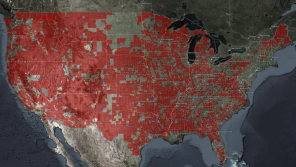Broadband advocates seek sustainable replacement after Affordable Connectivity Program

Funding for the Federal Communications Commission’s Affordable Connectivity Program ran out at the end of May, leaving some broadband advocates fearing the impacts felt by the 23 million households that received the monthly internet discount and searching for long-term solutions.
Christopher Mitchell, director of community broadband networks with the Institute for Local Self-Reliance, told StateScoop that the end of the popular program likely will not mean that those households will be entirely without internet, but will instead fall back on unsustainable and unreliable options for internet connectivity.
“I think we would expect millions of households will now not have internet service, but most of the households that were on it will probably go back and forth between subscribing when they have money and then unsubscribing when they’re running low,” Mitchell said. “It’s not the case necessarily that everyone loses internet access right away.”
Households that qualified for the program saved between $30 to $75 each month on their internet bills. With the sunset of the ACP, some internet service providers are voluntarily offering plans at $30 or less to low-income households through the end of the year, including AT&T, Verizon, Spectrum and Comcast, along with some smaller, regional providers.
And while the ACP helped bridge the digital divide, Mitchell called the federal program “deeply flawed,” calling on the FCC to find a more sustainable solution.
“We’ve treated this issue like it’s a technological problem that can be resolved by a cable or telephone company, rather than a problem of poverty, that includes an element of affordability as well as elements around device access and digital skills,” he said.
Mitchell pointed to community solutions, like a project in Cleveland, Ohio, by the nonprofit program DigitalC that aims to tear down barriers to internet connectivity by providing a network that is affordable, reliable and sustainable. DigitalC advertises internet services at rates as low as $18 a month.
During the pandemic, the City of Cleveland set aside $20 million of its pandemic recovery funds to support DigitalC, and Ohio Gov. Mike DeWine this year awarded the nonprofit another $10 million.
“These are actual investments into networks that will meet local needs,” Mitchell said. “The idea that we can solve digital equity by hoping the cable companies do a better job is not wise. Comcast’s Internet Essentials program has been around for more than 10 years, and they’ve accomplished enough to give them credit for helping out more than a million families. At the same time, we know that it is not nearly enough.
“I get frustrated at ACP because it’s doing something, but we know that it will not resolve the issue,” he said. “We fight over ACP rather than focusing on the larger issue.”
Since January, members of Congress have made some attempts to introduce bills that would have continued funding the ACP, but those never crossed the finish line. President Joe Biden’s administration in April blamed Republican lawmakers and asked them to support the program’s continuation.
Congressional Republicans last December drafted a letter to FCC Chair Jessica Rosenworcel citing concerns that ACP was “wasteful” and that the narrative of its success was “misleading.” Mitchell said that generally it was Democrats fighting to extend the program alongside only a handful of Republicans.
“I think in some ways, [Republicans] would probably agree with me that it is a wasteful program, but they also have no interest in actually fixing the market problems that caused the need for a program like ACP,” Mitchell said.
Mitchell said he expects the FCC to develop a permanent, sustainable program that seeks to truly fulfill the mission of the ACP.
“What I’m focused on is all of the places in which we see mostly cities, sometimes philanthropy and sometimes states, making investments to make sure that we have more networks like DigitalC in Cleveland,” he said. “That’s ultimately what we need are networks that are focused on low-income households rather than maximizing revenue.”






